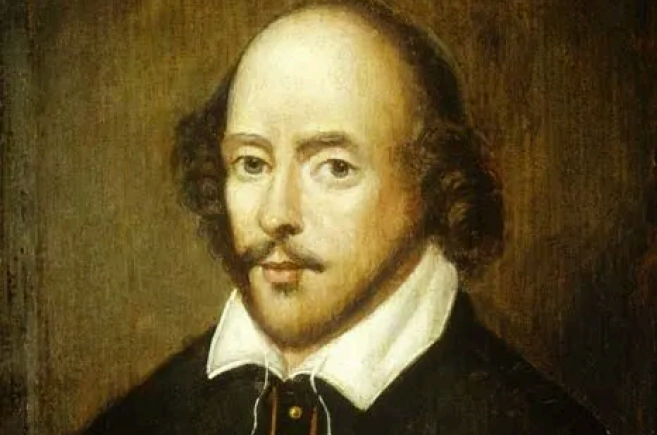
Portrait of William Shakespeare. British School. ©LondonMuseum
Shakespeare in the Boardroom!
Imagine having Hamlet and King Lear as your strategic advisors.
By Mohammad Alomar
CEO, Globalis Consulting Group
CEO, Globalis Consulting Group
July 23, 2024
Literature sits at the pinnacle of human imagination. Its richness extends beyond poetic imagery and
insightful meanings, delving into subtle explorations of the self and the world. A wealth of profound
life lessons lies embedded between the lines of poetry and the dialogues of characters in plays,
offering insights in every scene. Engaging with these literary treasures emancipates the mind,
elevating one to the highest horizons of intellectual pleasure. Here, ideas of creative innovation are
within reach, honing your skills and enhancing your perspective on both life and business
In the realm of executive leadership, particularly among those with a rened appreciation and sophisticated appetite for literature, as well as high cultural and creative intelligence, the classics offer invaluable lessons that sometimes transcend conventional management wisdom. As highlighted in an intriguing article from The Economist https://lnkd.in/essTAHaV, these works provide a profound exploration of the human condition, imparting insights into virtues such as honesty, empathy, and strategic foresight, which are pivotal in the corporate world.
The classics also elucidate the darker aspects of human nature through characters and narratives that
mirror challenges in modern business environments. Shakespeare’s works, for instance, provide
timeless lessons on power dynamics and ethical leadership. In “King Lear,” the eponymous
character’s tragic aw is his inability to discern true loyalty, leading to his downfall. CEOs can heed
Lear’s warning:
“How sharper than a serpent’s tooth it is
To have a thankless child!”
(Lear, Act 1, Scene 4)
This underscores the importance of recognizing and valuing genuine dedication and loyalty within
their teams.
Similarly, “Hamlet” offers profound reections on decision-making and the consequences of
inaction. Hamlet’s soliloquy, “To be, or not to be: that is the question” (Act 3, Scene 1), prompts
leaders to consider the paralysis that can result from overthinking and the necessity of decisive
action in the face of uncertainty
Moreover, George Orwell’s “Animal Farm” provides critical lessons on power and corruption. The
character Napoleon epitomizes how unchecked ambition and the consolidation of power can lead to
the betrayal of foundational ideals. The animals’ failure to achieve their goals is a stark reminder of
the dangers of absolute power and the lack of accountability. Napoleon’s rise to power and
subsequent tyranny illustrate how leaders can manipulate and exploit for personal gain, leading to
organizational failure.
Benjamin, the cynical donkey, represents the consequences of passive dissent. His awareness of the
corruption but reluctance to act contributes to the farm’s decline. This highlights the importance of
proactive engagement and the courage to challenge unethical practices within an organization.
The downfall of the animals in “Animal Farm” underscores the necessity for vigilance, ethical
leadership, and collective responsibility. Leaders must ensure that power is balanced and that voices
within the organization are heard and valued
Adding to this rich tapestry of literary lessons, Nikos Kazantzakis’ “Zorba the Greek” offers
valuable insights into the balance between thought and action, the importance of human connection,
and embracing life’s uncertainties. Zorba’s zest for life and his philosophy of living passionately and
in the moment provide a stark contrast to the narrator’s more reserved nature. This balance teaches
CEOs the importance of fostering a positive and energetic work environment while also valuing
deep, meaningful human connections.
Zorba’s resilience and adaptability in the face of challenges highlight the importance of exibility
and a positive attitude for effective leadership. Additionally, Zorba’s willingness to take risks and
embrace uncertainty encourages leaders to step out of their comfort zones and explore new
opportunities, fostering innovation and growth.
On another side, Antoine de Saint-Exupéry’s “Le Petit Prince” provides a poignant reminder about
the essence of true understanding and responsibility. The quote, “And now here is my secret, a very
simple secret; it is only with the heart that one can see rightly, what is essential is invisible to the
eye,” underscores the importance of empathy, emotional intelligence, and taking responsibility for
one’s actions. The Little Prince’s care for his rose and his bond with the fox teach CEOs that beyond
metrics and tangible assets, the true value often lies in the intangibles—trust, loyalty, and the
emotional well-being of their team. Moreover, the story emphasizes that leaders must nurture these
bonds and take responsibility for their impact on others, fostering a culture of mutual respect and
care.
In embracing these literary treasures, CEOs can cultivate a deeper understanding of the multifaceted
nature of leadership and the nuanced interplay of personal and organizational dynamics. This
enriched perspective enables them to navigate corporate complexities with greater wisdom,
fostering environments where strategic thinking and ethical considerations are paramount.
By integrating the wisdom of the classics into their strategic toolkit, cultured CEOs can transcend
the limitations of traditional management theories, steering their organizations with a blend of
intellectual rigor and humanistic insight. This approach not only enhances their leadership acumen
but also forties their capacity to inspire and lead in an ever-evolving global landscape.
For those seeking to rene their leadership through literature and elevating an important part of
their ‘cultural competitiveness advantage’, turning to these timeless narratives is not merely an
intellectual exercise but a strategic imperative that aligns with the highest standards of cultural and
professional excellence.
To be, or not to be: that will always be the eternal question, not only for Hamlet but for
thoughtful and intellectual leadership as well.
